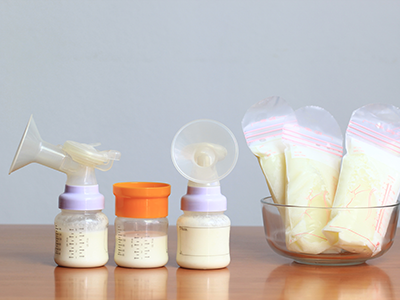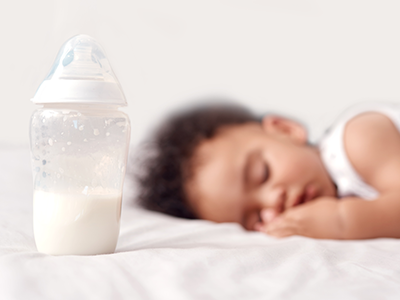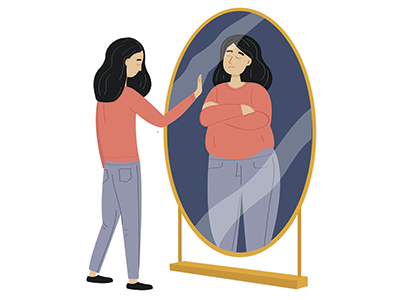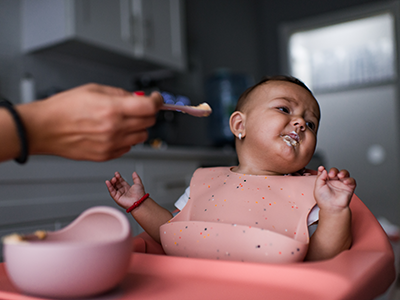While breastmilk helps ensure babies’ growth and development and reduces infections, it unfortunately comes up short in one respect — it’s a very poor source of vitamin D, which is a key nutrient that is essential for developing healthy bones. Fortunately, vitamin D deficiency caused by breastfeeding is entirely preventable with the right information, attention and care.
What is vitamin D and why do we need it?
Known as the sunshine vitamin, vitamin D is produced by the body when it is exposed to sunlight. It can also be found naturally in foods such as fish and egg yolks. In the 1930s, the United States also started fortifying a lot of foods — such as cereals and milk — with vitamin D.
Vitamin D helps regulate the amount of calcium and phosphate in the body, both of which are needed to help build strong, healthy bones and teeth.
Vitamin D deficiency in children can lead to rickets, delayed motor development, muscle weakness, aches and pains and fractures.
What causes vitamin D deficiency in babies?
Because breastmilk does not contain a lot of vitamin D, the main reasons for vitamin D deficiency in babies are prolonged breastfeeding without vitamin D supplementation and avoidance of sun exposure.
Naturally darker skin is an additional risk factor for vitamin D deficiency in breastfed infants because darker-skinned individuals produce less vitamin D in response to sunlight, causing the vitamin D concentration in their breastmilk to be lower than that of lighter-skinned individuals.
Vitamin D deficiency can also be caused by prior conditions such as cystic fibrosis or other disorders of exocrine pancreatic function, gastrectomy or extensive bowel surgery, celiac disease, inflammatory bowel disease and other malabsorptive conditions.
How much vitamin D does my child need?
The recommended daily intake of vitamin D is 400 IU/L (10 mcg) for infants and 600 IU/L (15 mcg) for children 1 to 18 years old. Vitamin D supplementation is recommended for children who consume less than 1000 mL (33 oz) of vitamin D-fortified milk daily unless they have ample regular exposure to direct sunlight.
How can I prevent vitamin D deficiency in my baby?
If you’re pregnant, make sure that you’re keeping your own vitamin D levels up. An infant’s vitamin D levels depend on the amount of vitamin D they received from their mother in the womb as well as the amount of vitamin D they ingest and process during exposure to ultraviolet light. When a woman has very severe vitamin D deficiency during pregnancy, her baby can have signs of rickets at birth or during the first three months of life.
Because all infant formulas in the United States contain at least 400 international units (IU/L) (10 mcg/L) of vitamin D, formula-fed babies do not need vitamin D supplements. However, the diet of exclusively breastfed infants and partially formula-fed infants does not provide the recommended intake of vitamin D, so it is important that all breastfed infants receive vitamin D supplements.
Once your baby has started eating solid foods, they can start getting vitamin D from fortified foods like breads, cereals and milk.
 https://riseandshine.childrensnational.org/wp-content/uploads/2026/01/healthy-family-feature.jpg
300
400
Rise and Shine
https://riseandshine.childrensnational.org/wp-content/uploads/2017/11/childrens_riseandshine_logo.jpg
Rise and Shine2026-01-28 13:02:522026-01-29 09:53:52Celebrate American Heart Month together: Healthy habits for the whole family
https://riseandshine.childrensnational.org/wp-content/uploads/2026/01/healthy-family-feature.jpg
300
400
Rise and Shine
https://riseandshine.childrensnational.org/wp-content/uploads/2017/11/childrens_riseandshine_logo.jpg
Rise and Shine2026-01-28 13:02:522026-01-29 09:53:52Celebrate American Heart Month together: Healthy habits for the whole family


 Nadia Merchant, MD, was a pediatric geneticist and endocrinologist at Children’s National Hospital.
Nadia Merchant, MD, was a pediatric geneticist and endocrinologist at Children’s National Hospital.


















Leave a Comment
Want to join the discussion?Feel free to contribute!